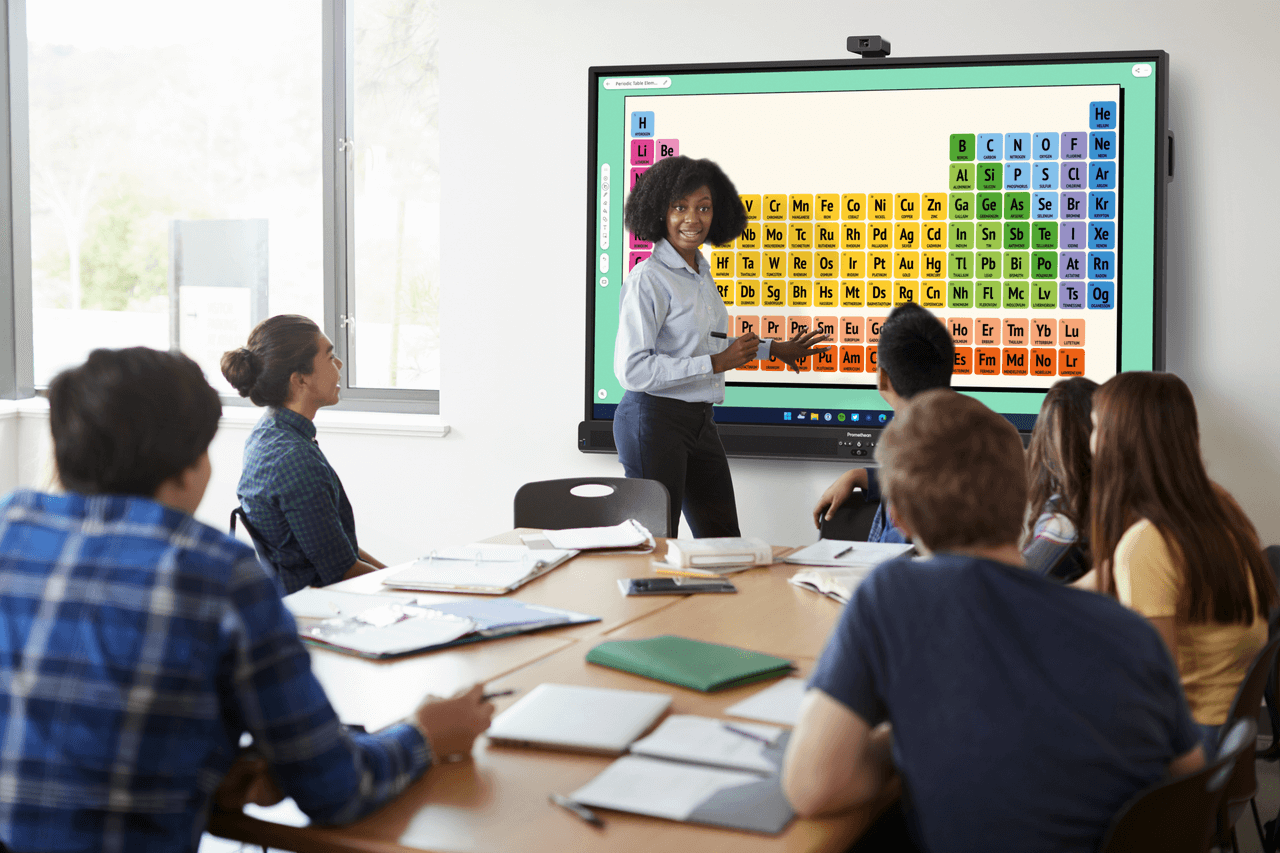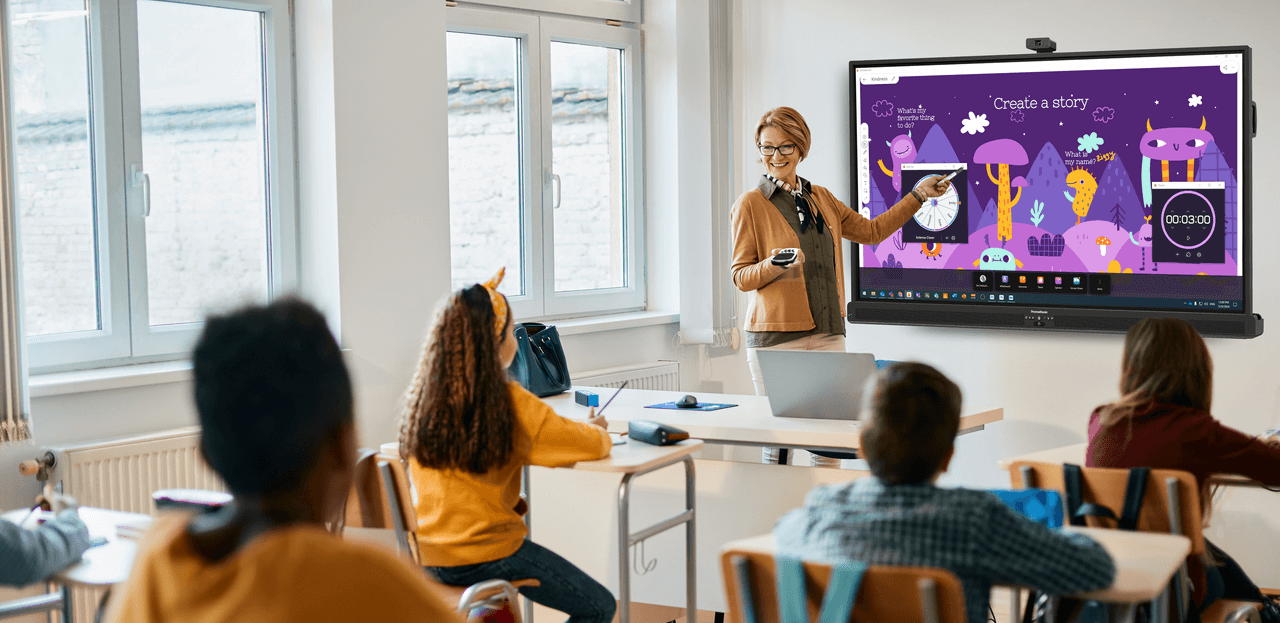Published on February 1st, 2023
Everything you need to know about adaptive learning
8 minute read

Plus, the best subjects for adaptive learning
From slate boards and chalk to stylus and tablet, the tools we use to drive learning are constantly evolving. As the landscape of the classroom changes, educators must adapt their teaching techniques to better serve their students.
One educational system – aptly named adaptive learning – uses evolutions in edtech to better address the needs of each student. All students – including social learners, solitary scholars, and hands-on students – can benefit from adaptive learning.
Keep reading for insight and tips to incorporate adaptive learning in your classroom, all with the help of Promethean smart panels and software.
Our education consultants are always on the lookout for the “next big thing” – the next improvement, the next tool, the next strategy to help teachers build strong, lasting connections with students and help them look forward to learning.
Adaptive learning is custom learning (No more one-size-fits-all)
Adaptive learning is any technology or virtual educational system designed to address a student’s needs. Most commonly found in online web-based platforms, adaptive learning software is programmed to help guide students through information.
AI-driven systems analyze student performance in real-time, using data to modify teaching methods. The result is a tailored, personalized learning experience that maximizes the student’s potential for success.
3 of our favorite AI-powered educational tools
- ELSA – Helps non-native English speakers improve their pronunciation with confidence
- Amira Learning – Reading assistant helps improve confidence and language fluency
- CogniFit – Improves visual perception, processing, and hand-eye coordination
Access each of these platforms on your Promethean ActivPanel!
Data analysis can even pinpoint the methods and timing necessary to best communicate lessons to the student. With programs like Promethean’s ClassFlow, assignments are reviewed and graded as completed, allowing the software to make on-the-fly changes to its systems while also providing the instructors with immediate and accurate feedback.
Symphony Classroom by Merlyn Mind is another helpful tool that facilitates custom learning. This digital assistant software can chime in to help students access video aids and online resources, and can even notify them when instruction time is almost up.
It’s the digital assistant designed for teachers, by teachers. From anywhere in the classroom, simply say “Hey Merlyn” and follow up with your request. For example, you can say “Hey Merlyn, open the Water Cycle presentation,” and Merlyn will pull up the presentation instantly. No walking back and forth, no digging in files – Merlyn makes it easy.
Adaptive learning examples
Adaptive learning programs look at a few different behavior and performance benchmarks to create a profile of each student.
These metrics are then analyzed and used to adapt the algorithm’s behavior.
Performance monitoring
Monitoring a student’s performance on any given task, adaptive learning programs will track information like:
- How many questions were answered correctly
- Time spent answering each question
- Subjects in need of improvement
In addition to reporting these metrics to the educator, adaptive learning systems can also make adjustments to their own protocols, the way a real-life educator would to better adapt to the student.
Differentiated instruction
One of the most valuable benefits of adaptive learning is that it gives educators a greater ability to differentiate their lessons. Sticking to one rigid form of instruction can be a detriment to the lesson – not just for individuals, but for the class as a whole.
Using adaptive learning technologies, teachers can offer students unique sequences of content and instruction that effectively connect the individual to the subject matter. Students who learn at a slower pace get the extra time and attention they need. More adept students can engage with appropriate challenges and advanced material.
Real-time feedback
As classrooms grow in size, the amount of time and consideration an educator can give to any one particular student diminishes. With instant data processing, adaptive learning technologies give educators information that would otherwise take hours of grading and assessment.
When an educator can receive data like test results and performance assessments in real-time, it frees them up to give feedback and care to individual students. This is time that’s usually spent reviewing papers and marking tests.
Best subjects for adaptive learning
Math
Subjects centered around objective facts and information often lend themselves well to adaptive learning. Teaching math, a subject where students often feel left behind, is greatly improved with an adaptive learning model.
Using an AI platform, educators can assign students math lessons based on their respective proficiency in the material. These programs can offer students hints and tips when they’re stuck on a question. They may even offer students space to work out their problem-solving abilities virtually, using digital scratch paper or calculators.
Real-time grading means students receive instant feedback on whether or not they’ve correctly answered a question. This gives a better understanding of where they’ve made an error and guides them to the correct solution.
Science
Science, much like math, is a subject where following processes and procedures are necessary to reach the appropriate solution.
With adaptive learning technologies such as Merlyn Mind’s Symphony Classroom, virtual assistants can chime in to help students in need by opening appropriate video aids, directing students to online resources, or notifying students when instruction time is nearing completion.
Adaptive learning technology built by teachers, for teachers
While not every subject is an appropriate fit for AI learning technologies, the classroom benefits of adaptive learning are indisputable.
Advanced educational programs quickly analyze student performance, revolutionizing the way teachers interact with their students. Meanwhile, automatic grading dramatically reduces the amount of time an educator spends on busy work.
Using AI learning models, educators can adapt their classroom and teaching styles to drive student engagement and positive learning outcomes.
Adaptive learning with Promethean
Using edtech and advanced lesson delivery software, educators spend less time reviewing and more time working directly with their students. As classrooms grow in size and the demands of instruction become more challenging, adaptive learning technology fills the gap.
And with technology like Promethean smart panels and essential apps, educators have never been in a better position to adapt and evolve their classrooms.
Request a demo today to see the Promethean ActivPanel in action.




